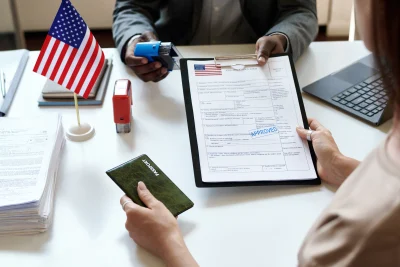Resource Center
New to the U.S.? Let Us Help You Set Up
We’ve put together a set of guides to help you settle into your new community
Articles by Category
Most Popular Articles

How to apply for an American Express Card with your foreign credit history
Moving to the U.S. used to mean that you need to build credit from scratch in order to apply for credit cards. Using Nova Credit, you can now use foreign credit history to apply for American Express cards in the U.S.

How to build credit in the U.S.
This article discusses how to build credit in the U.S. when you first move here—including applying for secured cards, using your credit score from your home country, and more.

How to get Credit Cards for non-U.S. citizens in 2023
This article walks through some of the best credit card options for non-U.S. citizens, which you can even apply for before you have an SSN or a U.S. credit history.
All About American Culture

How to Connect with New People in the U.S.: A Guide for Newcomers
Learn how to connect with new people who have shared professional, social, or cultural interests after moving to the U.S.

How to apply for a driver's license in the U.S.
This article explains how long you can drive with your foreign license in the U.S. and discusses how to apply for a local license.

How to report your rent to credit bureaus
Most households pay rent responsibly and on time, but that track record of on-time payments has historically not been reflected in their credit history.
Building Credit

How to get Mortgages for Non-U.S. Citizens
Non-U.S. citizens can get a mortgage in the U.S., though challenges exist. Residency status and creditworthiness are key factors in determining available options.

How to check your credit history in the U.S.
Learn how to check your credit history in the U.S. through several credit monitoring tools—many of which are free to use.

How to apply for a credit card without a Social Security number (SSN)
You may not have a social security number. Read how to apply for a credit card without an SSN to build your credit. Learn all you need now!
Education

18 Universities in the United States that Offer Day One CPT
Students who are admitted to the United States must be enrolled in Curricular Practical Training, or CPT

The complete guide to OPT work permits: How long does it take to get an EAD card for OPT?
Students on F-1 visas may choose to take part in optional practical training (OPT) to gain experience in their respective fields and further their careers. In this article we explain everything you need to know about OPT EAD

How international students can get financial aid
Financial aid for non-citizens is available in the form or scholarships, federal financial aid from abroad or private student loans from banks and other lenders.
Finding Housing

5 tips for getting an apartment in the U.S. without a credit history
This article discusses the top five tips about how to get an apartment in the U.S., even if you do not have a U.S. credit history.

How to get Mortgages for Non-U.S. Citizens
Non-U.S. citizens can get a mortgage in the U.S., though challenges exist. Residency status and creditworthiness are key factors in determining available options.

How to report your rent to credit bureaus
Most households pay rent responsibly and on time, but that track record of on-time payments has historically not been reflected in their credit history.
Jobs & Careers

How to start a business in the U.S. as an immigrant
Learn the various considerations when trying to start a business in the U.S. as an immigrant through this comprehensive guide.

How to Prepare for your U.S. Work Visa Interview
Your visa interview is a critical step towards securing a work visa to live in the United States. Here are our top tips on how to prepare.

H-4 EAD: How to obtain work authorization when your spouse has an H-1B Visa
Will a career boost for your husband or wife translate into a career stumbling block for you? Understand the rules around dependents of H-1B visa holders.
Managing Your Money

How to send money abroad without spending a fortune
What to do and what to avoid when sending money abroad.

Top 5 Things To Do After Your Visa Is Approved
Getting a U.S. visa approval is an exciting milestone, but make sure to follow these top five next steps to ensure the rest of your immigration process goes smoothly.

Everything J-1 visa holders need to know about taxes
Visa-holders are subject to local laws—including taxes. Below, we explain the tax obligations of J-1 visa holders living and working in the U.S.
Navigating Visas

What is Concurrent Adjustment of Status?
Here’s what you need to know about the ‘Concurrent Adjustment of Status’ provision for EB-5 visas available since March 2022.

The Ultimate Guide to the EB-3 Visa
The employment-based EB-3 visa enables newcomers with a job offer to live and work in the U.S. permanently.

Top 5 Things To Do After Your Visa Is Approved
Getting a U.S. visa approval is an exciting milestone, but make sure to follow these top five next steps to ensure the rest of your immigration process goes smoothly.
Become An Expert In Moving to the U.S.
Our newsletter, The Arrive, has the best advice on setting up life in the U.S., whether you’re planning the move, have recently arrived or are staying long-term.
